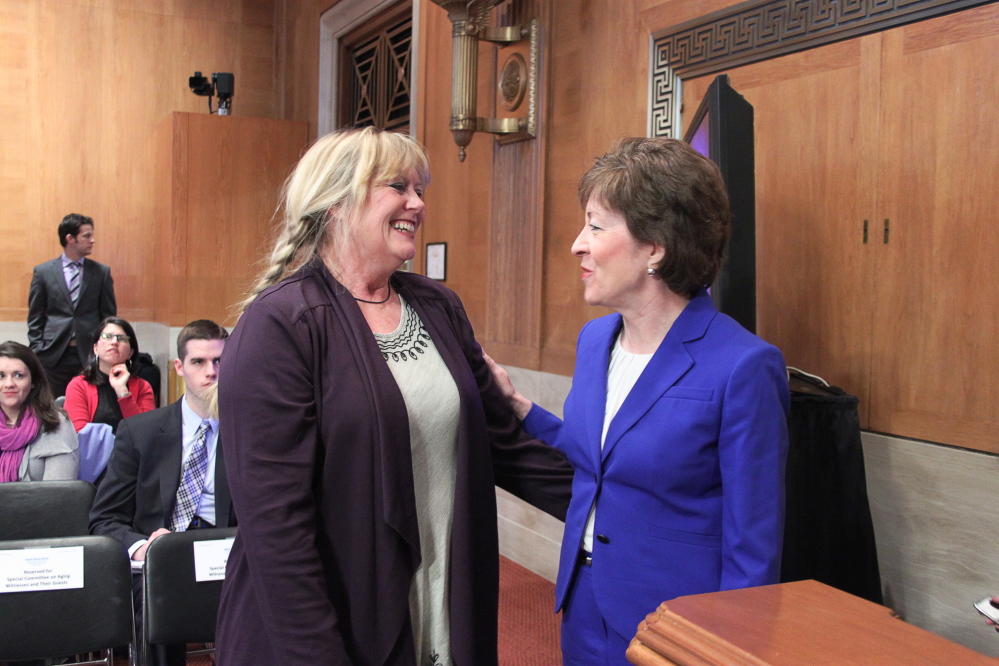WASHINGTON — As the director of a hunger relief program serving far northern Maine, Dixie Shaw said she has seen and heard countless stories of elderly residents silently struggling to feed themselves.
Each month, cars and taxis begin lining up outside the Catholic Charities Maine warehouse in Caribou long before it opens to distribute “food packs” intended to last recipients several weeks. But to truly understand the “food insecurity” facing many rural Maine seniors you must look inside their refrigerators, Shaw told members of a Senate Special Committee on Aging during a hearing on elder poverty.
“You will see a half of a potato. And if you ask about that they’ll say, ‘Oh, I cooked that a couple of days ago and I am just trying to make it last. I’m out of potatoes,’ ” said Shaw, program director of Catholic Charities’ Hunger and Relief Services program in Aroostook County. “And we’re in potato country, so that shouldn’t be. But they are so proud, they don’t want to ask.”
The creation of Social Security and Medicare programs dramatically reduced the number of elderly Americans living in poverty. Yet about 9 percent of non-institutionalized seniors – about 3.5 million – still live below the poverty line, defined as $11,173 for an individual or $14,095 for a couple. In Maine, that figure is about 8 percent.
That national number jumps to 15 percent – 12 percent in Maine – when out-of-pocket health care costs are factored in, according to the Henry J. Kaiser Family Foundation.
And a recent U.S. Government Accountability Office report predicted that the percentage of seniors living in poverty could increase as housing costs increase, more unmarried adults reach old age, and because voluntary 401k retirement programs have increasingly replaced pension plans.
Speakers during Wednesday’s hearing – organized by Sens. Susan Collins, R-Maine, and Bill Nelson, D-Fla. – said the problem is most severe among elderly minorities, unmarried women and those living in rural areas. They said out-of-date federal policies, shrinking social service budgets and inadequate public outreach are making matters worse for many seniors.
“As our society and economy continue to evolve, supports for the elderly may need to evolve with them, particularly as the boomer generation swells the number of new and nearing retirees,” said Barbara Bovbjerg, managing director of education, workforce and income security for the Government Accountability Office.
One option is to adjust some financial qualifications for Supplemental Security Income – which provides additional income beyond Social Security for low-income seniors and others. The standards were established in the 1970s and have never been updated for inflation.
Several speakers also criticized the Social Security Administration’s education efforts to ensure able-bodied seniors understand that Social Security benefits increase substantially for each year a person continues working past age 62.
“Social Security has a real opportunity to help people understand this and we have not felt that they have taken this opportunity,” said Bovbjerg. “They need to start (education efforts) earlier than at age 62.”
Roughly one in three Maine seniors relies entirely on Social Security for their income, compared to one in four seniors nationally. The average annual Social Security payout nationally is less than $16,000 a year.
“It is hard to imagine stretching those dollars far enough to pay the bills,” said Collins, the committee’s top Republican. “Certainly putting money away to cover unexpected emergencies or out-of-pocket medical expenses is out of the question.”
Catholic Charities’ Hunger and Relief Service program served approximately 24,000 people of all ages at its 25 food pantries in Aroostook County last year. Shaw said those numbers increase dramatically during colder months, when seniors in rural Maine face another big expense: heating costs.
“They are trying all kinds of creative ways to survive, from unhooking dryer vents, lighting candles inside clay pots and to plugging in expensive and unsafe electric heaters,” said Shaw, who appeared at Collins’ invitation.
Collins and Nelson have introduced a bill that aims to increase Americans’ ability to save for retirement. It would help small businesses cover costs of retirement programs for employees and increase the maximum amount of employee retirement contributions that employers can match.
Collins said afterward that Congress must make sure the Social Security Administration is explaining the financial benefits of retiring at age 65 or older. “I don’t think there is enough attention to that issue,” she said.
The Senate Special Committee on Aging held Wednesday’s hearing as part of its oversight of issues affecting the elderly. While the committee has no legislative authority, it regularly holds hearings in order to raise the profile of key issues and makes recommendations on legislation.
Kevin Miller can be contacted at 317-6256 or at:
kmiller@pressherald.com
Send questions/comments to the editors.




Success. Please wait for the page to reload. If the page does not reload within 5 seconds, please refresh the page.
Enter your email and password to access comments.
Hi, to comment on stories you must . This profile is in addition to your subscription and website login.
Already have a commenting profile? .
Invalid username/password.
Please check your email to confirm and complete your registration.
Only subscribers are eligible to post comments. Please subscribe or login first for digital access. Here’s why.
Use the form below to reset your password. When you've submitted your account email, we will send an email with a reset code.